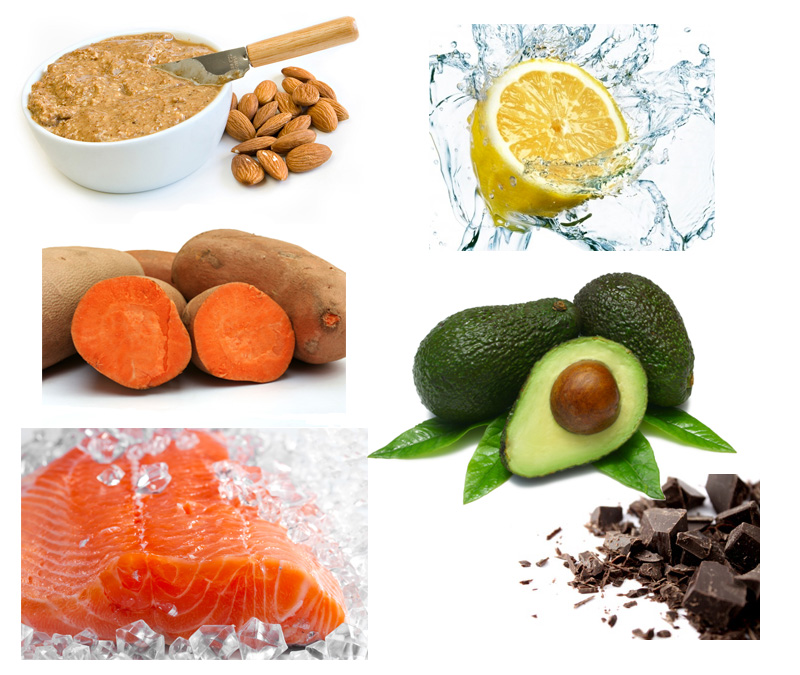
Most of us women think about food a lot…what we should be eating, what we shouldn’t be eating, do we have enough time to cook, are we eating enough healthy foods, are we going to gain weight….we could literally drive ourselves crazy! The amount of time spent obsessing can border on embarrassing – at least speaking for myself and my friends – so I thought it would be interesting to speak to some experts about foods that have been shown to make us feel good, beyond the obvious healthy choices. Foods, it turns out, can powerfully effect our mood and I’m not just talking about the guilt from eating too many cookies! Here’s what Stacy Goldberg, nutritionist and founder of Savorfull, and Lexi Sinclair, content and blog editor at Savorfull had to say on the topic. Looks like it’s going to be salmon for dinner…
Dark Chocolate
Dark chocolate truly is one of the most powerful mood-boosting foods because it causes the brain to increase the production of serotonin and dopamine, neurotransmitters that increase relaxation and release endorphins. Dark chocolate is also an excellent source of magnesium, a nutrient that is essential to regulating emotions and balancing mood. Opt for one or two squares of 70% dark chocolate or higher on a daily basis for maximum health benefits and mood-enhancing effects.
Wild Salmon
Salmon contains high levels of omega-3 fatty acids, nutrients that play vital roles in brain health. Studies have shown a correlation between the consumption of fish with high levels of omega-3 fatty acids and a decreased risk of depression. The body does not naturally produce omega-3s, so it is most beneficial to consume wild salmon twice a week to ensure maximum health benefits. Salmon is also a good source of vitamin D, a powerful energy booster that is linked to the efficiency of mitochondria, the “power stations” within your body’s cells. On top of that, salmon contains tryptophan, a precursor to serotonin, which helps regulate your mood. If possible, always choose wild-caught Alaskan salmon over farmed salmon, as it has the lowest risk for possible contaminants, including pesticides and pollutants.
Avocado
Avocados are one of the healthiest and most delicious ways to incorporate healthy fats into your diet. The fats in avocado aid the absorption of the fat-soluble vitamins found in many other fruits and vegetables, meaning you receive a wider range of essential nutrients from the foods you are already eating. Avocados also contain a number of beneficial vitamins and minerals, including vitamin K; vitamins B5, B6, and B9; and vitamin C.
The monounsaturated fat found in avocados also promotes healthy brain function, stabilizes mood, and prevents blood sugar crashes. Diets low in healthy fats are associated with stress, anxiety, depression, and frustration. Bonus! This a surprisingly versatile food, and is delicious blended into a smoothie, used as a creamy replacement for cheese, or spread onto toast and topped with a poached egg.
Sweet Potatoes with Cinnamon
It may seem like a strange combination, but cinnamon helps bring out the natural sweetness of this starchy, root vegetable. Sweet potatoes have a low glycemic index, meaning they release sugar slowly into the bloodstream, preventing a rapid spike in blood sugar, while stabilizing energy and mood. They are also high in fiber, vitamin B6, potassium and magnesium, all of which have unique mood-boosting properties. Cinnamon is also helpful in controlling blood sugar and has anti-bacterial, anti-microbial, and healing properties. The spice is effective in relieving gastrointestinal distress and may aid in digestion. A happier gut = a happier you!
Nut Butters
Cashew, almond, pecan, walnut and hazelnut butters, in moderation, are yummy ways to incorporate a wide range of beneficial nutrients that improve your health and mood. Nuts contain essential nutrients that aid in serotonin and dopamine production. Low levels of these neurotransmitters are associated with increased risk of depression, so it is important to consume small serving sizes (about an ounce) of various nuts on a daily basis. Nut butters also make a great creamy topping to a hot bowl of oats or an excellent addition to baked goods.
Lemon Water
Just the scent of a fresh lemon has mood-enhancing and energizing effects. Lemon contains high levels of vitamin C, an immune-boosting vitamin that helps ward off the common cold. Stress depletes vitamin C, so it is essential to consume natural sources of vitamin C frequently. Starting your day with a glass of lemon water (room temperature water with freshly squeezed lemon) will help you start your day on the right foot by hydrating the lymph system, detoxing the liver, and flushing your digestive tract. Lemon water consumed first thing in the morning also balances the pH levels in your body by reducing the body’s overall acidity. Maintaining a slightly more alkaline environment in your body is essential to the proper function of many systems and the prevention of several diseases.









It’s great to see salmon getting a spot on this list, as science continues to show how beneficial the fish is for baby-brain health, heart-health, and as focused on here, mental health. However, it’s disappointing to see this article single out wild salmon. Science shows that both farmed and wild salmon contain unique and essential nutrients that Americans should be eating more of. In fact, the 2015 Dietary Guidelines for Americans sustainability subcommittee concluded in their public meetings last fall that both farmed and wild-caught seafood uniquely provide essential omega-3s and both types of fish should be part of a healthy diet. Other science, like this study completed by the USDA specifically says, “We showed that consuming farm-raised salmon was an excellent way to increase omega-3 fatty acids in the blood to levels that corresponded to reduced heart disease risk,” says Picklo. (http://agresearchmag.ars.usda.gov/2013/may/salmon). Americans consume far too little seafood, and messages discouraging them from type or another results in them eating less altogether. Both farmed and wild salmon should be part of a healthy diet. -Rima Kleiner, MS, RD, National Fisheries Institute